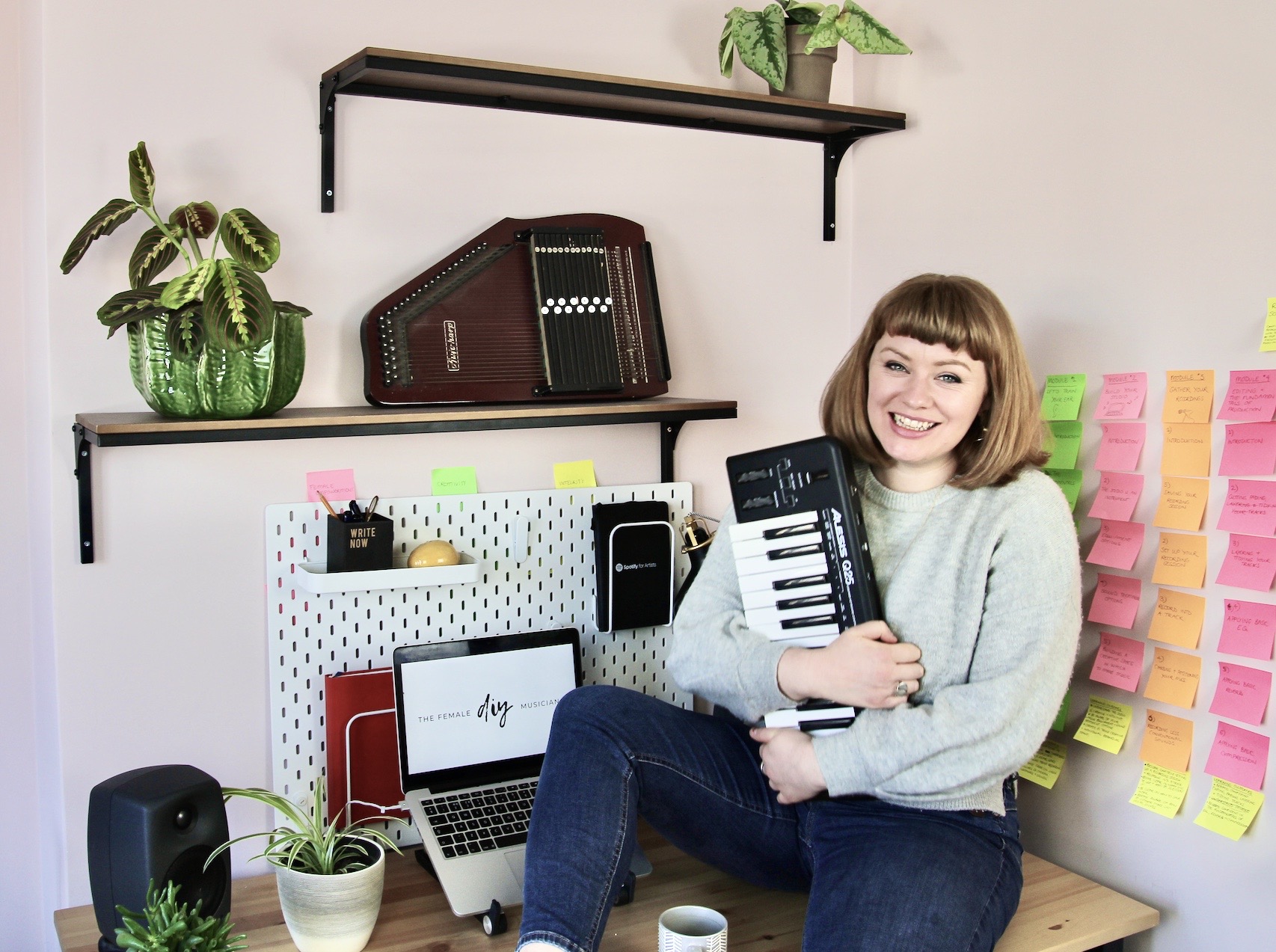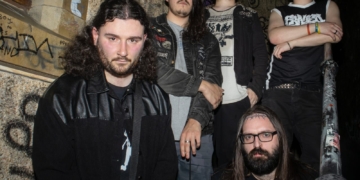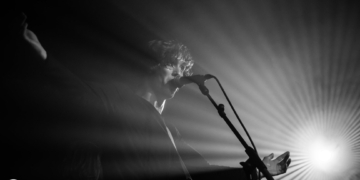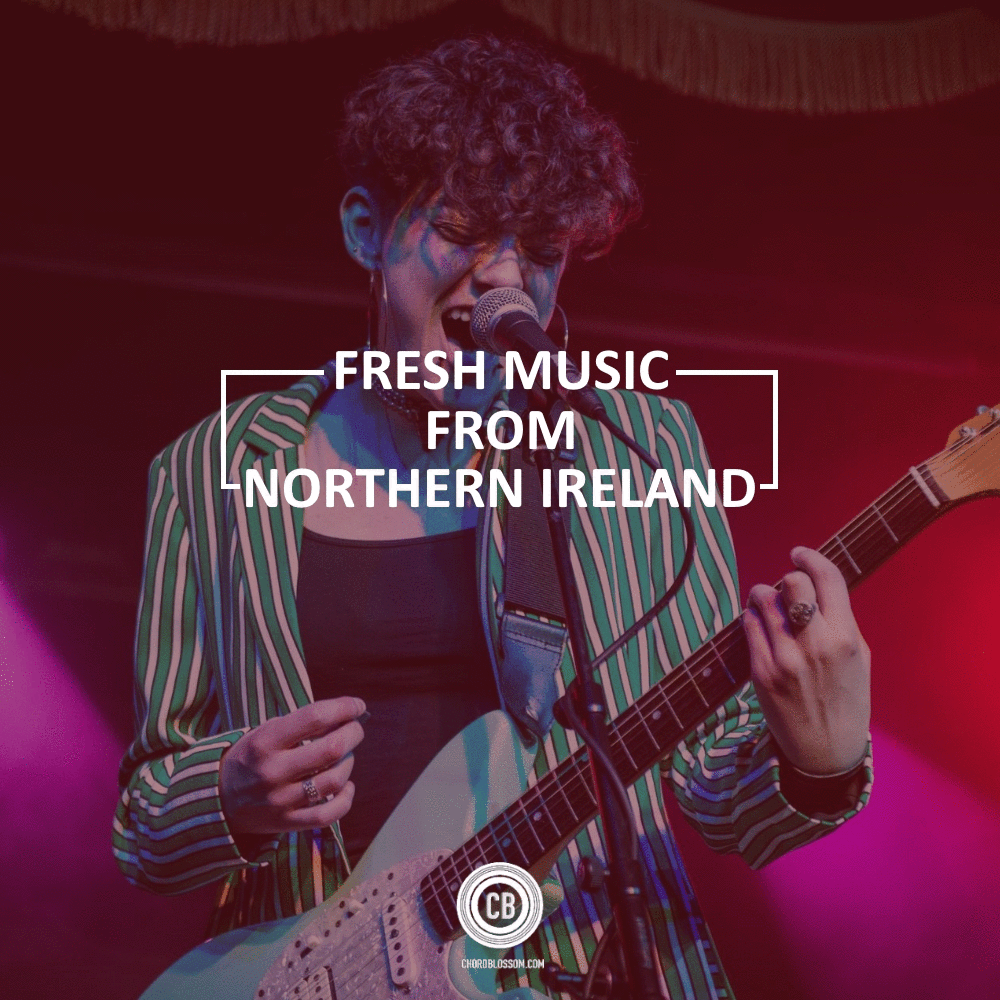Isobel Anderson is qualified for pretty much anything to do with the sonic arts. Aside from 25 million streams on Spotify, she has a PhD in Sonic Arts acquired from Queen’s University and teaching credits in leading industry colleges such as London’s Institute of Contemporary Music Performance (ICMP) and BIMM. Here her roles include teaching music production to the creative sound students and creative process to postgraduate songwriting students as well as holding the position of head of the major production project for the music production postgraduate course at ICMP. “My creative process is now about helping other people. I’d done so much with my own music and what I want to focus on now is other’s music. I am happy to do it and I get a lot of fulfilment from it.”
She is a busy woman, loyal to sound production as a creative medium. “Being able to record and produce yourself is as important as playing an instrument for musicians now – especially post-Covid. Most people who start doing this find out that there is not much gap between writing, recording and producing. The labels are blending now and all these things are part of the creative process.”
Her new project is born out of these two things; teaching and DIY recordings. Having toiled with the music industry for the best part of her adult life, Anderson saw gaps and looked to fill them. Moving to Belfast from the south of England at the age of 25, she secured a scholarship to study a Masters in sonic arts at Queen’s University. The course was – and remains – very full on, with appendages of physics, computer programming and mathematics. “I had a big learning curve and I felt like ‘that woman’ all the time. I got a distinction and secured the HRC scholarship, finishing top of my class, but in the first few weeks I was regularly in tears in the course leader’s office.” Anderson defines ‘being that woman’ as the feeling of having to represent all women and failing to do so positively in male orientated fields. “If you are part of a mixed gender group and you put your hand up to ask a question there’s the fear of being ‘that woman’, whereas if it’s an all female group that pressure is just not there.”
She released her first album following the completion of her MA. “I’d spent the year learning to record and finished with an album’s worth of songs. When I’d left for Belfast, I’d made up my mind to give up on being a traditional musician and thought I’d go down the path of being a beep boppy experimental musician. I felt like that boat had sailed. But then I thought “fuck it” and released this CD. I made 100 copies, I glued the cases together myself and sent them off to radio stations. I did a launch at Black Box and it did reasonably well locally. So I did a few more albums and by then the third album was taking off on Spotify. I finished my PhD and released my fourth album. And that’s when I thought of making resources for other women.”
The ‘Female DIY Musician’ is Anderson’s latest big thing. It is an online course which teaches female musicians how to record and produce their own music. The premise is a simple one but there is nothing really like it on this scale available solely to young women. To date the group, which is known affectionately as the ‘Female Musician Tribe’, is already made up of 560 musicians based around the world. ‘FDIYM’ came out of Anderson tracing the root of her own success. “There was luck and talent, but in terms of the pathway, my musical success was because I took this very brave/foolish/wise move to do it myself. I stopped waiting for someone else to come along and give me permission or for a leg up.”
With four self recorded, produced and released full length albums to her name, Anderson is something of a veteran in the field of doing it yourself. However, whilst looking back at success and this fact as a reflection of her own skill and know how, she recognises the privilege of her position in studying the subject she did and how it gave her access to the right equipment and the right knowledge at the right time, “I was looking at ways I could help women put releases out and start putting music out and take up more industry space. Then I started feeling like I would like something that had more form, something that wasn’t just weekly resources but useful and transformative skills because not everyone is in a position where they can just do a PhD or solely focus on their music like I have been able to.”
Through market research and casual conversation Anderson found that the way to empower was to arm young female musicians with information. “I first started talking to women about doing a course on releasing but people kept saying ‘that would be amazing but I don’t have any recordings’ and then the penny dropped. The reason I was able to release my music was because I’d been taught how to record it. So I knew I had to do a course on recording.” And so the ‘Female DIY Musician’ was born.
In mid-September Anderson will launch her new course ‘Home Recording Academy’ (which you can enroll in from 16th-24th September). Whilst beta versions have been circulating for a little while now, this month marks the first official opening of the project. “I am excited because [recording] is where the creative stuff is. I think women sometimes see it as not that and the attitude towards it is ‘oh God, I’ve got to learn how to use Logic and it’s going to be so laborious’. I wanted to help women see how creative and empowering it is. I wanted to make a course that was not just about releasing music but about believing in yourself, asking the question why when you’re going into a field where so many people will do things without explaining to you. The course is designed solely for women and female identifying people in mind. I never identified with the sort of image of guys geeking out over beats and I think it was something that held me back and stopped me from getting further than I could have done quicker. “
‘Empowering’ is the choice adjective of Anderson for her own project but she is firm to explain “I don’t think the key to empowerment in music is about doing everything yourself; I think it’s about choices.” She goes on to elaborate, “someone may never want to learn how to record themselves and that’s fine. But there’s so many other people who don’t have a record company backing them and they don’t have parents who are willing to pay 30 thousand for recording sessions. On another level, empowerment is about believing that you can do this. If you see this come up when it comes to recording, you’ll see it elsewhere. Do you really trust yourself to be bad at something and learn how to do it well?”
The nature of ‘female empowerment’ – in music and in general – is gendered for a reason. Anderson talks about the importance of young women taking up space in an industry that tries to meld its young participants into boxes. “Producers have a lot of clout in how it sounds and reaches the process – It’s empowering to understand what’s going on in that room. If you have some knowledge of the process you are able to articulate your ideas and wants in a way that someone with no exposure wouldn’t be able to. For women this is about building confidence. At the very least, this course will help women feel much more confident about being in those situations and at the very most, they will feel much more confident to make choices about how little or how much they do themselves.”
The course itself is learn-at-your-own-pace in its structure. With lifetime access to the library of lessons including the constant updates, the ‘Home Recording Academy’ is seven modules released over the course of eight weeks. Each module is made up of 6-7 lessons, contains a 2-10 minute video and its own workbook which participants can use to hone and develop their weekly skills. There is no entry level requirement or prerequisites to the course; “It’s easily digested. You can be a trained musician or someone who just plays guitar in their room. You don’t need any level of musical training or a head for recording – we go from basics right up to interesting, more complex stuff. It’s good for beginners and for people with experience as well. It’s not just me saying ‘hit this button to do this’, it’s about what emotions you’re trying to evoke and why you’re using frequencies in a certain way, why you are using padding like that; how to develop self as a recording artist. What I’m teaching is based on sound theory which is what I specialise in. It’s not a go through the motions manual but something more interactive and exploratory.”
The first module starts right at the root and discusses expectations and narratives participants already have about recording. It looks to tackle what Anderson calls “music tech gremlins”, imposter syndrome and self sabotaging tendencies early on in the course. The following modules look at training your ear to listen like a producer paired with group discussion workshops, beginning to record and a step by step guide from launching the computer programme to recording the first track. Then it gets more technical with the fundamentals of production; how to edit and piece tracks together looking at equalisers, compression and reverb. With the basics down, the experimentalism can begin with mixing techniques. Then the more real world problems of how to use these recorded demos to get funding, appeal to collaborators or get radio play.
It is not a matter of getting your recordings and saying goodbye. During the eight weeks of live delivery, Anderson will drop a module each week and conduct multiple Facebook livestreams. After the two months are up, everybody who graduates from the course is moved into a new Facebook group where they have access to ongoing support. “They don’t just get lifetime access to material but lifetime access to me,” Anderson laughs, “members can request hot seats, have troubleshoot one on one lessons with me or strategise their upcoming releases. Once a month I will go live for a Q&A. It’s not just ‘here, download a course and off you go’, it’s also about being a part of a community. I’ve seen this in other industries. Community is so important. It’s important to have a place to share nerves and stresses and a place to celebrate victories. I want this to actually help women gain new skills. I don’t just want it to be a tech course.”
In the weeks leading up to her launch, Anderson has pulled out all the stocks in offering teasers and stand alone talks to cultivate interest. “Every week I go live in the ‘FDIYM’ Tribe Facebook group talking about different aspects of recording. One week I talked about how there’s no one way to go about recording your music but how you do need to plan how you record. It’s not good enough to sit down at your laptop every now and again, open Logic and get frustrated at it. You can have different approaches that set you up to succeed but good practices are always about getting your work done. Another week I talked about women making the best producers. Qualities we associate with femininity such as listening, compassion and empathy are so useful for recording.” The 11th September will see a free 5 day challenge called ‘Clean Up Your Recordings (You Dirty Girl)’. With her beta users Anderson has already helped women learn how to make cleaner home recordings in an environment free from judgement. Her webinars have been deeper dives into the technicalities of recording, giving homework and tasks to complete outside of lesson time. “The community is so amazing and full of women who are so thirsty to have a female centred group to air their ideas and opinions.””
Being in the subversive position of moving from a larger city like London to Belfast, Anderson noted how a community like the one she is trying to hone online is inherent in the music scene here. “I never felt part of a community in London. I was doing all this gigging but I was in a different venue every week and never saw the same musician more than once or twice. In Belfast I finally started bumping into people I knew. I had much more access to a social life that I didn’t have in London.”
Now Anderson is happy to place her own music releasing on hold whilst she encourages her students. Despite this, the limitations that drive so many musicians out of this city are not lost on her. “By the time I’d finished my PhD I had 10 million streams. In 2013-2015, being in Belfast made it hard to transition to the next level.” Her last album ‘Chalk / Flint’ was released in 2017 whilst it was widely noted to be her most ambitious album, reviews of Anderson’s work are consistently mixed. “[My albums] are a marker of their time and a lot of the stuff I would call mistakes now where actually things that made those early albums so unique and beautiful. I listen to them and think ‘no one else would do that, that’s actually so cool’. I think people picked up on that at the time. Chris Jones [AU magazine] did a review and he said all the vocals and mixing was so experimental, whilst other people would listen and say ‘oh you need to do these things’.”
The truth of the matter is the rules set in place by traditionalist producers can be easily bent. “I would always say to people ‘start before you’re ready’. I wasn’t ready to release a professional album in the way I would if I were an EMI producer but if I waited until then, I would never have released anything. I think something that holds women back is the thought that ‘I’m never going to do this as well as such and such’ but I totally believe that no one else will do what you do. The studio is an instrument just like any other and clarity comes after action.”
With her business model that looks more like a community and a lesson plan that lends itself to slow and fast learners alike, Isobel Anderson’s ‘Female DIY Musician’ might just be the making of a new way into music making that is much more about bridge building than gate keeping.
You can sign up for the free 5 day challenge here: https://mailchi.mp/919aa77cab83/5-day-challenge
Or find out more about Isobel and the FDIYM at: https://www.femalediymusician.com/








